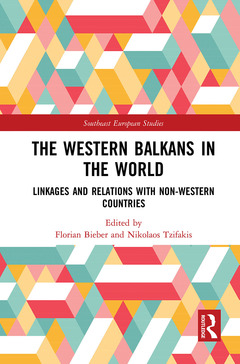The Western Balkans in the World Linkages and Relations with Non-Western Countries Southeast European Studies Series
Coordonnateurs : Bieber Florian, Tzifakis Nikolaos

This book provides a detailed understanding of how different types of engagements impact upon the reform and EU integration of the Western Balkan region. It examines the influence of Russia, China, Turkey and the UAE in the region and analyses the range of existing links.
Contributors offer an academic and multifaceted perspective of the role of external and non-Western actors in the region that goes beyond, on the one hand, the tendency of some Western decision makers to perceive all engagement by third powers as a sinister threat and, on the other, the view of regional governments of all external involvement as a boon coming at a time of Western neglect and reduced foreign investments. By looking at the importance of Russia, Turkey, China and the UAE in the Western Balkans, the book sheds light on one key arena of global competition, offers new insights on the strengths and weaknesses of Euro?Atlantic integration and advances our knowledge of foreign policy and its economic, social and security dimensions for small and medium-sized countries.
It will be of interest to academics, postgraduate and research students, and think-tankers with research interest in IR and Southeast European Studies. European decision makers will also gain an insight into the extent of non-Western influence in the region.
Introduction: The Influence of External Actors in the Western Balkans
Part I Regional Dynamics
Chapter 1 Security co-operation in the Western Balkans: Cracks and erosion of Euro-Atlantic integration?
Chapter 2 The economic development of the Western Balkans: The importance of non-EU actors
Part II Western Balkan Case Studies
Chapter 3 Serbia: Looking East, going West?
Chapter 4 Bosnia and Herzegovina: Abandoned by the West, embraced by the East?
Chapter 5 Kosovo: Between Western and Non-Western States
Chapter 6 North Macedonia: A fertile ground for external influences
Chapter 7 Montenegro: Always at a Crossroads
Chapter 8 Albania: New Geopolitics and shifting linkages
Part III Non-Western Countries
Chapter 9 Russia: Playing a Weak Hand Well
Chapter 10 China: A New Geoeconomic Approach to the Balkans
Chapter 11 Turkey: Forced marriage or marriage of convenience with the Western Balkans?
Chapter 12 UAE: Sultanism meets illiberal democracy.
Conclusions
Florian Bieber is Professor for Southeast European History and Politics at the University of Graz and director of the Centre for Southeast European Studies.
Nikolaos Tzifakis is Associate Professor of International Relations at the Department of Political Science and International Relations of the University of the Peloponnese.
Date de parution : 12-2021
15.6x23.4 cm
Date de parution : 06-2019
15.6x23.4 cm
Thème de The Western Balkans in the World :
Mots-clés :
Zayed Bin Sultan Al Nahyan; UNCTAD’s Database; Balkans; Western Balkans; Society; SFR Yugoslavia; Albania; FDI Stock; Bosnia; Western Balkan Countries; EU; Western Balkan Economies; Governance; IMF Data; Kosovo; Russian MFA; Montenegro; NATO Membership; Small Powers; Balkan Countries; Euro–Atlantic integration; ICG Report; foreign policy; NATO Accession; Western Balkans' economic development; Bin Zayed Al Nahyan; foreign investments; EU Membership; EU Member State; EU’s Share; NATO Enlargement; EU Declaration; Global Gdp Growth; EU Trading Partner; EU’s Enlargement Policy; Western Balkan Region; EU Accession Process; ICTY’s Work



